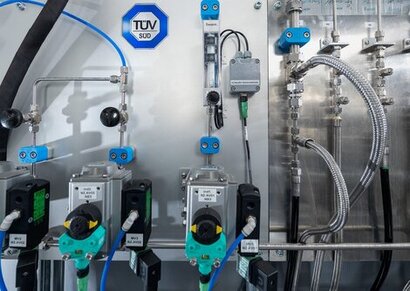
A further focus will be on training and qualifications for the safe handling of hydrogen. The aim is to enable reliable statements to be made concerning the suitability of materials, components, and systems for use with hydrogen. This is addressed by standards such as P003, which covers the resistance of materials to hydrogen under pressure. The company has also drawn up guidelines on the H2 readiness of combined-cycle and gas-engine power plants; these documents support manufacturers and operators with developing a roadmap for conversion to operation with hydrogen, and thus protect investments in sustainable energy supply.
The company also offers hydrogen safety and performance testing across the entire pressure and temperature range for hydrogen, helium, and gas mixtures. Other services include functional and life tests for components, hydraulic burst tests and gas flow tests, pressure-vessel leakage and permeation tests, and hydrogen compatibility tests on metallic and non-metallic materials, as well as product and system certification.
This portfolio of services is rounded off by EMC testing for hydrogen systems and environmental testing for components and pressure vessels in accordance with LV123/124.
The physical tests are performed in the Tüv Süd laboratories at locations including Garching near Munich. The testing infrastructure supports simulations of realistic conditions of use, from cyclic pressure stresses to thermal shock testing. Testing of mechanical strength, vibration and corrosion resistance, and electrical safety form an integral part of the service scope and are a key element of product and system certifications at both national and international level.
Tüv Süd offers special certification schemes that can be used by manufacturers of fuel-cell systems, electrolysers, and H2 system components to demonstrate the safety and quality of their products. So far, these schemes have been directed at factory-produced fuel cell systems for power and heat generation, electrolysers, and hydrogen-carrying components.
These components are used in applications such as H2 filling stations and in vehicles that use hydrogen as an energy carrier. The corresponding certification schemes are designed to comply with various standards including the IEC 62282 series of standards, ISO 22734 for electrolysers, ISO 19880-X for components used at filling stations, ISO 19887 for vehicle components, and ISO 17268 for refueling nozzles and receptacles and protective caps.
The product tests on which certification is based cover aspects such as electrical safety, EMC, material behaviour, long-term stability, and leak tightness. The certification thus provides verification of conformity with the standard while also ensuring operational safety under realistic conditions.
For employees working in the manufacturing and operation of hydrogen systems and plants and in hydrogen mobility, Tüv Süd offers a role-based qualification scheme awarding appropriate certification of persons in the safe handling of hydrogen across the entire hydrogen value chain; current seminars offered by Tüv Süd Academy address the topics of “Material compatibility in connection with hydrogen,” “Affixing the CE marking to hydrogen systems,” “Safety and approval of hydrogen drives for rail vehicles,” and “Safer working on systems with hydrogen.”
For additional information:

